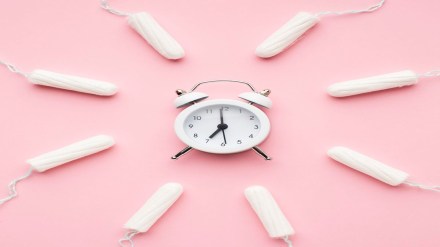Menstrual Health Day 2024: Menstrual health significantly impacts various aspects of a woman’s life, including her sleep patterns and quality of rest. The menstrual cycle, which typically lasts around 28 days, involves hormonal fluctuations that can affect everything from mood to energy levels, and importantly, sleep.
According to Dr Paparao Nadakuduru, Internal & General Medicine Physician, Citizens Specialty Hospital, Hyderabad, understanding the relationship between menstrual health and sleep can help women manage their cycles better and ensure they get the restorative sleep they need.
Menstrual Cycle and Hormonal Changes
The menstrual cycle is divided into four main phases: the menstrual phase, the follicular phase, ovulation, and the luteal phase. Each phase involves changes in the levels of hormones like estrogen and progesterone, which play a crucial role in regulating sleep.
- Menstrual Phase (Days 1-5): This phase starts on the first day of menstruation and lasts until about the fifth day. During this time, levels of estrogen and progesterone are low. Many women experience cramps, headaches, and fatigue, which can disrupt sleep.
- Follicular Phase (Days 1-13): Overlapping with the menstrual phase and continuing until ovulation, this phase sees rising levels of estrogen. Higher estrogen levels generally promote better sleep quality, as this hormone is associated with an increase in REM sleep.
- Ovulation (Day 14): Around the middle of the cycle, a surge in luteinizing hormone triggers ovulation. Some women may experience a slight dip in sleep quality due to the hormonal shifts and mild discomfort associated with ovulation.
- Luteal Phase (Days 15-28): Following ovulation, progesterone levels rise to prepare the body for a potential pregnancy. Progesterone has a sedative effect, which can promote sleep. However, if pregnancy does not occur, progesterone levels drop sharply before menstruation begins again, leading to premenstrual symptoms (PMS) that can interfere with sleep.
Impact of Menstrual Health on Sleep
- Premenstrual Syndrome (PMS): PMS includes a range of symptoms like bloating, mood swings, irritability, breast heaviness, and insomnia, which can occur one to two weeks before menstruation. The drop in progesterone and estrogen can lead to disruptions in sleep patterns, making it harder to fall asleep and stay asleep.
- Menstrual Cramps: Dysmenorrhea, or painful menstrual cramps, is a common issue that affects many women during the menstrual phase. These cramps can be severe enough to interfere with sleep, causing frequent awakenings and reduced sleep quality.
- Mood Disorders: Hormonal fluctuations during the menstrual cycle can affect neurotransmitters in the brain, influencing mood and emotional well-being. Women with premenstrual dysphoric disorder (PMDD), a severe form of PMS, often experience heightened anxiety and depression, which can severely impact sleep.
- Body Temperature: Progesterone raises body temperature during the luteal phase. Elevated body temperature can disrupt sleep by making it harder to fall asleep and stay asleep, as cooler body temperatures are more conducive to sleep.
- Sleep Disorders: Women with menstrual disorders such as endometriosis or polycystic ovary syndrome (PCOS) may experience additional sleep disturbances. Endometriosis can cause chronic pain, while PCOS is often associated with sleep apnea and other sleep issues.
How to improve your sleep cycle?
Dr Paparao Nadakuduru shares some important tips to improve your sleep quality throughout the menstrual cycle:
- Maintain a Regular Sleep Schedule: Going to bed and waking up at the same time every day helps regulate the body’s internal clock and improve sleep quality.
- Create a Relaxing Bedtime Routine: Engage in calming activities before bed, such as reading, taking a warm bath, or practicing meditation, to signal to your body that it’s time to wind down.
- Exercise Regularly: Physical activity can help reduce PMS symptoms and improve overall sleep quality. However, avoid vigorous exercise close to bedtime.
- Monitor Your Diet: Eating a balanced diet and avoiding caffeine and heavy meals before bedtime can promote better sleep. Incorporate foods rich in magnesium and vitamin B6, which can help alleviate menstrual symptoms.
- Manage Pain and Discomfort: Use over-the-counter pain relief, heat pads, or relaxation techniques to manage menstrual cramps and discomfort that might interfere with sleep.
- Keep Your Sleep Environment Cool: Since body temperature affects sleep, ensure your bedroom is cool and comfortable. Using breathable bedding and sleepwear can also help.
“It is important to understand the relationship between menstrual health and sleep is essential for women to manage their cycles effectively and maintain good health. By recognizing how hormonal fluctuations affect sleep patterns and implementing strategies to mitigate these effects, women can improve their sleep quality and overall well-being,” Dr Nadakuduru told Financial Express.com.
He also emphasised that it is crucial to maintain a regular sleep routine, manage diet and exercise, and address menstrual discomfort can go a long way in ensuring restful and restorative sleep throughout the menstrual cycle.
